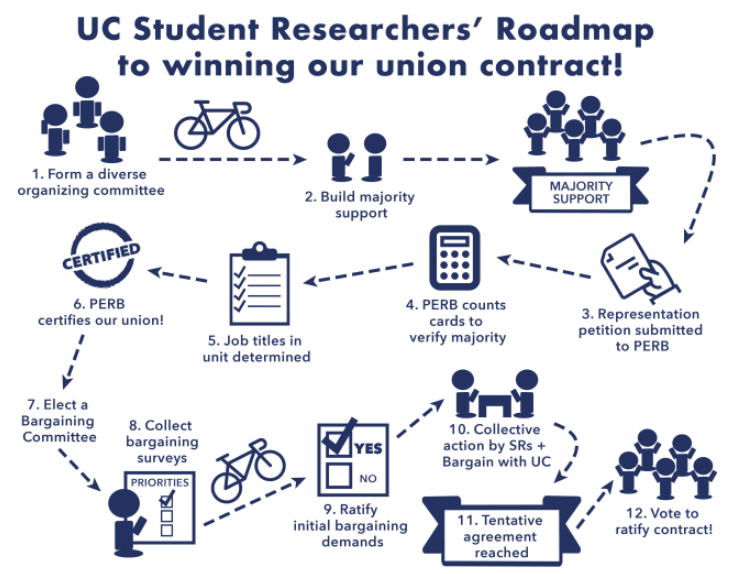Many who continue their astronomy education by getting a masters or PhD do so because of a genuine passion for the field and contributing to our cumulative understanding of the universe. This passion makes graduate students brilliant and devoted scientists, but it also makes it easy for institutes to take advantage of this dedication and exploit the students. More and more, stories of workplace abuse perpetrated against students and early career researchers, exacerbated by a lack of impartial arbitration options, as well as reports of stipends stagnating against inflation have been entering the conversation around attending grad school, especially in the United States (US). To match this conversation, there has also been rising discussion surrounding grad student unions.
The presence of a student union at a grad school is a different priority for everyone, and can end up being a quality to weigh against all the other qualities of the grad schools that someone is interested in attending. Just like any other feature of a grad school, it’s important to be informed about what it means for you and your time at the school. This bite is focused on reviewing some of the important details of grad student unions in the US.
The Basics
A union is an organized association of workers formed to protect the rights and interests of said workers. Being in a union guarantees the workers the right to collectively bargain– the right for a bargaining unit composed of the employees to negotiate their contract with their employer– and take collective action (e.g. striking) against unfair labor practices . The right to establish a union in the US is protected for private-sector employees under the National Labor Relations Act (NLRA). The National Labor Relations Board (NLRB) is responsible for officially recognizing unions, as well as making sure the union and associated employers negotiate contracts in good faith.
Through the power of collective bargaining afforded by being in a union, grad students have been able to negotiate for things like minimum yearly stipend raises, legal expense coverage for international students, paid parental leave, and many other quality-of-life improvements to be a part of their contract. In this way, unions have been crucial for providing grad students the capacity to genuinely advocate for the things that are important to them to ensure a physically and emotionally healthy environment to do their research. If being in a union in grad school is important to you, there are a few questions to keep in mind when considering grad schools.
Does the school have a union?

This might seem like an obvious first question, but it’s important to not take for granted that not all schools have a union for grad students, nor can all schools even have a union. This is because the NLRA only applies to private-sector employees; public-sector employees (like grad students at public universities) were implicitly, and eventually explicitly, excluded from the bargaining protections of the NLRA. Instead, the right for public-sector employees to form unions is established at the state level. There are currently six states where collective bargaining is illegal for public employees; for these states, it will be nigh impossible to find a public university that also has a union or has the potential to form a union.
If the school doesn’t have a union, that doesn’t necessarily mean that it can’t! A typical roadmap for forming a union is shown in figure 1. The entire process for forming a union could be its own bite, so for the meantime, consider checking out the “What is the process of forming a union and bargaining a contract?” section of the University of California’s (UC) union FAQ. It’s worth noting that because UC is a public institution, the Public Employment Relation Board (PERB), instead of the NLRB, is responsible for certifying the union.
If you’re interested in forming a union at your school, consider reaching out to a parent union– a larger union that supports multiple chapters at various institutions and that already has the financial and legal resources to help with forming a union. Some examples of unions that represent graduate student workers include the United Auto Workers, the United Campus Workers, and the United Electrical Workers.
Who is allowed in the union?
Even if the school you’re interested in attending for grad school has a union– and even if it’s a union of grad students– it’s important to be cognizant of whether or not you actually qualify to participate and what that participation looks like. For instance:
- If the union requires that you be on a research or teaching assistantship, they may not allow those who are on institute fellowships to benefit from the bargaining process and the contract won in that process. You may eventually be able to join, but there are certain periods where it’s not guaranteed. When this is the case, you may not qualify for benefits that are only available to union-eligible students, like reduced health insurance rates.
- Some institutes claim that if you’re supported by an external fellowship, the institute itself is not responsible for paying you. Therefore, at these schools, you may never be able to join the union if you’re on an external fellowship. Thankfully, this isn’t the case for every school!
- Some schools include other groups of related employees, such as post-docs and research scientists or multiple campuses of a university system, in the union. While each of these groups of employees may have their own contract (e.g. grad students and post-docs do not get the same salary or benefits), they negotiate with the institute together. This leaves you beholden to the will of a larger group, but the large collection of people also gives you much greater negotiating power with the institute (10,000 striking people tends to be more persuasive than 1,000 striking people).
This is all to say that when looking at schools that have unions, it’s important to check who is included in the union (and whether it includes you).
What is in the contract? When is the next one being negotiated?
Not all grad-student union contracts look the same. While clauses related to minimum yearly stipend increases and healthcare standards are typically a given in contracts, other clauses (e.g. the presence of all-gendered restrooms and lactation stations) are not as common. It’s worth taking the time to read the contracts of all the schools you’re considering (both those with and without unions). If the school has a union that’s only formed in the past year or two, it’s worth checking to see if they actually have a ratified contract.
If the school you’re primarily interested in attending is missing some clauses you would rather it have, you can check when the next contract is being negotiated, and what is likely to show up in the contract. Contracts are usually re-negotiated every 1-5 years, with the negotiation process taking months to years depending on whether this is the school’s first union contract (which often takes longer to ratify) or how many changes are made between this contract and the previous one. Because the union is composed of and represents the employees, you have the power to introduce new clauses for consideration for the new contract. For instance, individual departments can be represented by union stewards (a student from the department who’s committed to be involved with union activities and advocates for students from their department in the union) such that the concerns specific to the department are represented. This is to say, even if the contract isn’t ideal, a union allows you channels to help change it.
Conclusion
Not being in a union by no means suggests that you will inherently suffer during your time in grad school, nor will being in a union guarantee you won’t have a hard time. Being a part of a union may not be one of your priorities for any number of reasons– when I was deciding on grad schools, I felt lucky just to have a couple schools to choose from at all. That said, there is no denying the significance of the role that unions have played in making grad school accessible to those historically and systemically excluded by academia by giving these people the tools to advocate, both for themselves and the resources necessary to support themselves. Whether you go on to grad school or another path, it is always worth asking yourself whether you are thriving or surviving in your environment, and a union can be the factor that makes that difference.
Astrobite edited by Sarah Bodansky
Featured image credit: Adapted from The Simpsons



